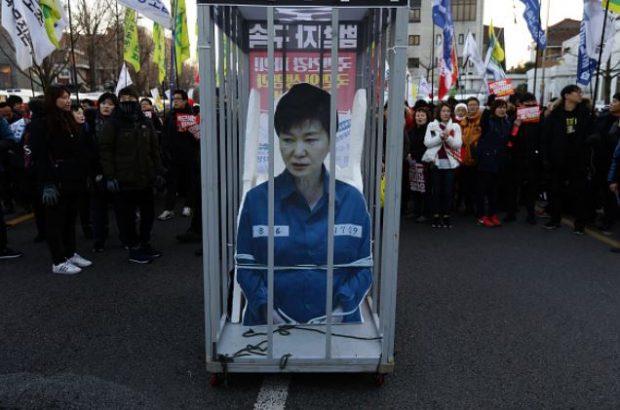 The South Korean national assembly’s decision on Friday to impeach President Park Geun-hye came as no great surprise. Since October a political scandal involving a typical Asian mix of influence pedalling, crony business government relations and an obscure religious cult have embroiled the nation’s first female leader, paralysed the government and led to massive street protests in Seoul most weekends.
The South Korean national assembly’s decision on Friday to impeach President Park Geun-hye came as no great surprise. Since October a political scandal involving a typical Asian mix of influence pedalling, crony business government relations and an obscure religious cult have embroiled the nation’s first female leader, paralysed the government and led to massive street protests in Seoul most weekends.
The country’s constitutional court will now decide the President’s fate. Her dismissal would require new elections, which must in any event take place before December 2017. The constitutional crisis has implications not only for democracy South Korean style but also for its tortured relations with the Pyongyang regime in the north, further exacerbated by its problematic relations with a rising China and its longstanding alliance with the United States.
The daughter of military dictator, subsequently President, Park Chun Hee, who ruled the country autocratically from 1961 until his assassination in 1979, Geun-hye came to power in 2012 on a wave of conservative nostalgia. Her father had presided over the rapid modernization of the country in the Cold War, which ran very hot on the Korean peninsula between 1951-3, culminating in the division between a Communist North ‘as close as lips and teeth’ to Beijing and the US backed South.
Park’s access to the US market facilitated South Korea’s distinctive development. By the 1990s close and often corrupt links between big business conglomerates like Hyundai, Daewoo and Samsung and the political and bureaucratic elites characterized the dynamic tiger economy. The country only acquired democratic characteristics in the 1990s.
Political and popular culture favours both Confucian and astrological guidance. Like her father and many Asian leaders, Park Geun-hye is deeply superstitious. Cult leader Choi Tae-min, a spiritual adviser to her father, exercised a Rasputin like influence over her. Choi died in 1994 but his daughter inherited his role apparently advising Park on policy while pressuring South Korean conglomerates like Samsung to contribute to non-profit organizations she controlled.
Political scandals have not been uncommon given the country’s troubled transition to democracy. Park’s autocratic successors, Chun Doo-whan and Roh Tae-woo, both found themselves imprisoned for conspiracy, insurrection and corruption. Even democrat reformer and Nobel Peace prize winner Kim Dae Jong found his liberal presidency imbricated in a corruption scandal that led to the imprisonment of his sons in 2003.The popular expectation of moral rule by its business and political elites has been constantly disappointed.
The current government’s loss of face, however, comes at a particularly bad time coinciding, as it does, with increased tensions on the Korean peninsula. Since 1998, when the liberal government of Kim Dae-Jung embarked on a ‘sunshine policy’ of openness to North Korea, successive South Korean administrations have faced an intractable regional political and economic dilemma.
Growing trade with China and historic difficulties with Japan, (Korea was a Japanese colony between 1910-45), saw South Korea adopting a more independent regional foreign policy stance after 2000.
This attempt to position itself as an independent middle power in the Asia pacific, however, suffered a severe setback when a North Korean torpedo sank a South Korean naval patrol vessel, the Cheonan, in March 2010. The unstable Kim Jong-un’s succession to the supreme leadership of the DPRK in 2011 only exacerbated tensions as the Pyongyang regime embarked on a policy of regional provocation with a particular eye to undermining the policy of openness.
The Park government came to power in 2012 promising a return to the regional diplomacy of her cold warrior father. In January 2016, North Korea conducted its fourth nuclear test. In response, South Korea announced talks with the United States to deploy a Terminal High-Altitude Area Defence (THAAD) system. Chinese foreign minister, Wang Yi, considered this deployment directly affected ‘the security interests of China’.
China ‘s reluctance to restrain North Korea saw Pyongyang conduct further intermediate range ballistic missile and nuclear tests between June and September this year.
South Korea’s Ministry of Defence subsequently announced it would bring forward THAAD deployment ‘as soon as possible’, a move Beijing considered provocative and ‘anti-China’.
Relations with both China and North Korea have sunk to their lowest ebb since the 1970s. Given that opinion in South Korea is deeply divided over the THAAD deployment; Beijing will view the government’s current embarrassment ripe for exploitation and a useful pawn in the escalating contest for regional power with the incoming Trump regime. As former President Kim observed, ‘Dawn will come even if you wring the rooster’s neck’.
David Martin Jones is Visiting Professor War Studies at Kings College, London
Got something to add? Join the discussion and comment below.
Get 10 issues for just $10
Subscribe to The Spectator Australia today for the next 10 magazine issues, plus full online access, for just $10.

























Comments
Don't miss out
Join the conversation with other Spectator Australia readers. Subscribe to leave a comment.
SUBSCRIBEAlready a subscriber? Log in